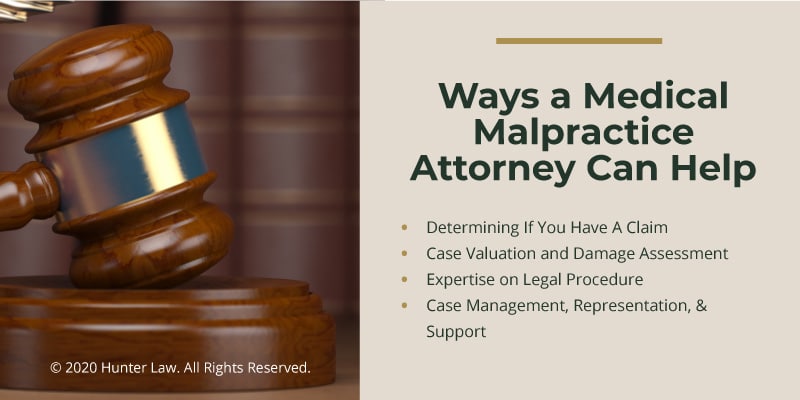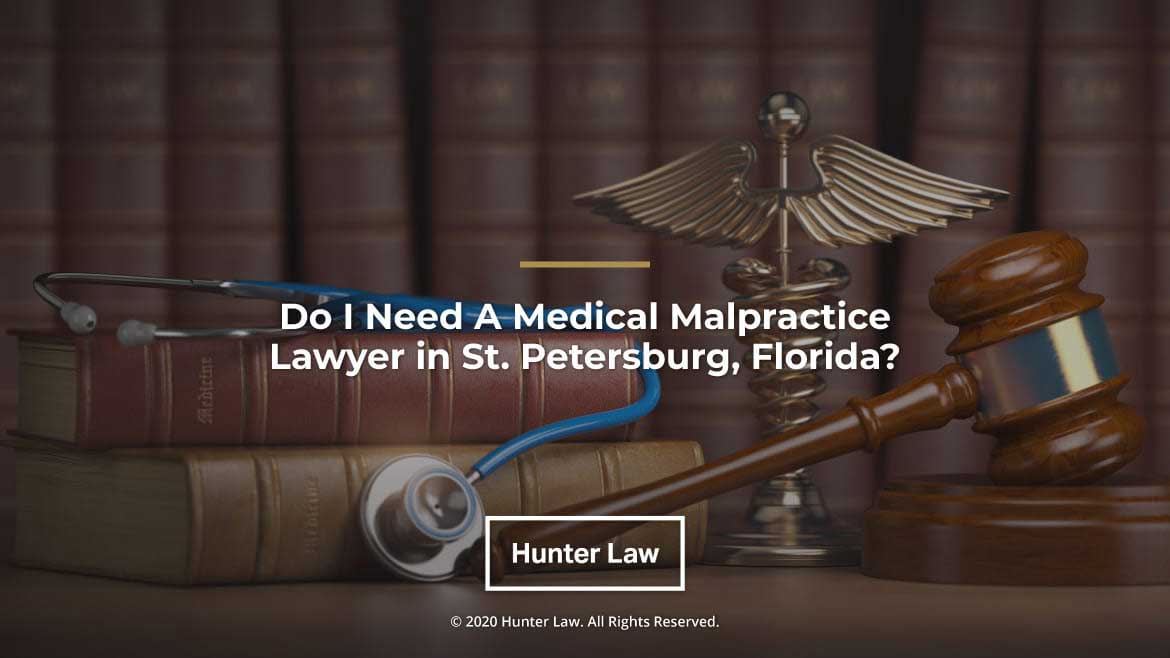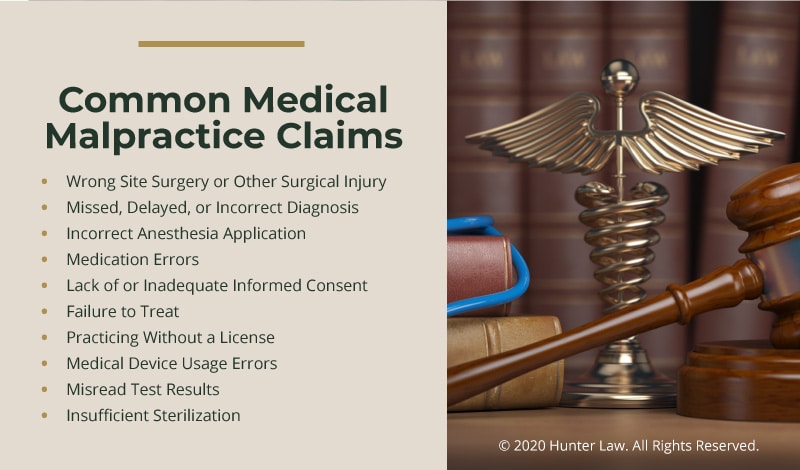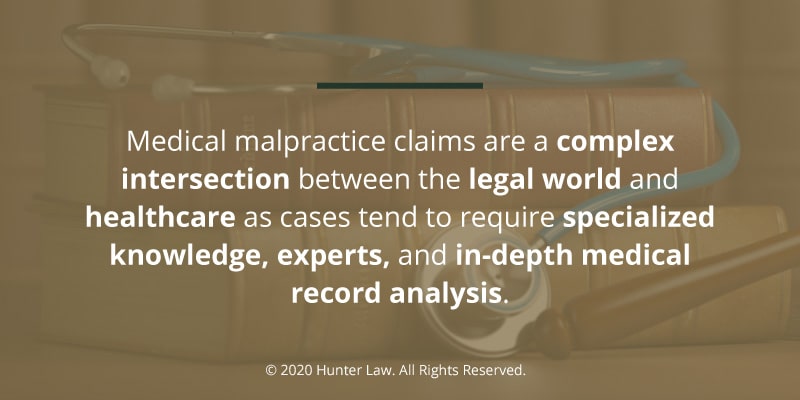If you believe you have been harmed as a result of medical treatment, enlisting the help of an experienced St. Petersburg medical malpractice lawyer can put you at ease as you navigate an already stressful situation. This article discusses this important legal topic.
Healthcare is something nearly everyone in the United States has experienced. Whether it be a quick visit to the doctor’s office or a major surgery, receiving high quality treatment is something everyone desires. Unfortunately, medical errors can often turn routine treatment into a nightmare. In fact, medical negligence is the third leading cause of death, falling just behind cancer and heart disease. While healthcare professionals are held to a high standard and undergo years of training, mistakes can still occur causing significant injury and/or financial hardship.
What Is Medical Malpractice?
Medical malpractice is when negligent treatment is given by a healthcare provider, and said treatment directly results in a patient’s injury, illness, or death. Anyone can be affected by improper medical treatment; however, those who are elderly, disabled, or suffering from chronic or rare health issues tend to be the most susceptible.
Common Medical Malpractice claims include:
- Wrong Site Surgery or Other Surgical Injury
- Missed, Delayed, or Incorrect Diagnosis
- Incorrect Anesthesia Application
- Medication Errors
- Lack of or Inadequate Informed Consent
- Failure to Treat
- Practicing Without a License
- Medical Device Usage Errors
- Misread Test Results
- Insufficient Sterilization
Though most people think of physicians when discussing medical malpractice issues, in St. Petersburg, and throughout Florida, specialists, nurse practitioners, nurses, and pharmacists can also be held responsible.
As you can see, medical malpractice can occur in a variety of treatment scenarios. However, in all of these cases, a plaintiff will need to show a direct causal link between the treatment provided and the harm alleged.
Understanding Medical Malpractice Lawsuits
Understanding your options and rights in a malpractice situation can be difficult without the help of a medical malpractice lawyer. Medical malpractice claims are a complex intersection between the legal world and healthcare, as cases tend to require specialized knowledge, experts, and in-depth medical record analysis. Additionally, in Florida, malpractice is generally underreported, meaning there is much unchartered territory regarding claims. Pursuing your claim with a thorough understanding of your evidentiary requirements, damages, and legal choices is paramount.
Furthermore, malpractice claims can take years to resolve. There are often lengthy fact-gathering periods, multiple court hearings and conferences, as well as mediation and/or settlement discussions. You should prepare yourself for a potentially time-consuming and financially/physically draining journey. A knowledgeable St. Pete attorney will be familiar with this process and can provide guidance on what to expect.
How Can A Medical Malpractice Attorney Help?
A medical malpractice attorney can help you every step of the way with your claim, from information gathering and deposition preparation through settlement or litigation. Here are a few ways an attorney can help.
Determining If You Have A Claim
If you are unsure whether the treatment you received amounts to malpractice, consulting with an attorney who is familiar with applicable Florida law can provide valuable insight.
While every case is different, generally, medical malpractice claims must demonstrate the following:
- A Provider-Patient Relationship: You will need to show the existence of a relationship between yourself and the healthcare provider named in your claim. This will help establish the duty owed to you as a patient.
- Failure to Meet the Standard of Care: The facts of your claims must establish that the healthcare provider violated or failed to meet the standard of care applicable to the type of treatment you received. These medical standards include competency, timely action, and appropriate treatment, among other things.
- Direct Causation: While violating medical standards is a serious issue, in many cases, the violation may only have the effect of a regulatory agency taking disciplinary action on the provider. In order to set grounds for a malpractice claim and applicable compensation, your claim must present at least one injury you incurred as a direct result of the violation and evidence that the injury would not have happened if treatment had been properly rendered.
- Damages: Lastly, your claim will need to show how the direct cause violation has affected you personally. This is known as damages. Damages can be physical, emotional, or financial (economic) in nature.

Case Valuation and Damage Assessment
Most people pursuing medical malpractice claims want to know what they may be able to expect in terms of compensation. Conferring with a medical malpractice attorney who has experience with cases of this nature is the best way to get an accurate sense of what you can expect.
A medical malpractice lawyer will use many different factors to assess the value of your case. Issues like type of care violation, severity of injury sustained, and the amount of legal representation and litigation support your case will need can all affect the viability of your claim.
Types of damages that may be awarded in medical malpractice claims include:
- Cost of Living with Permanent or Temporary Disability
- Past Medical Bills
- Future Medical Expenses
- Lost Wages
- Pain and Suffering
Expertise in Legal Procedure
Having an attorney explain the intricacies of legal procedures and manage them for you is critical to your claim process. Sometimes, even the strongest of medical malpractice cases can be negatively impacted by failure to adhere to the rules of civil procedure.
A medical malpractice attorney can provide guidance on:
- The Statute of Limitations (the amount of time after the incident you have to file your claim), as well as any state specific rules that may apply.
- The necessity and requirements of expert testimony
- The discovery phase; including, what documents to request and disclose, which relevant parties your team should depose, and what information may be missing
- Motion filings as well as court hearing and conference representation
- Mediation and settlement methods
- Trial approaches and strategies to best present your case

Case Management, Representation, & Support
Litigation is an inherently stressful experience, and the guidelines that regulate the process can vary depending on your state and even county. Having a local attorney in your corner who can handle the day-to-day of your potentially lengthy case can provide unimaginable peace of mind. Knowing that you have someone who is knowledgeable and experienced in cases like yours will be well worth it.
A medical malpractice lawyer will handle the seemingly endless and tedious amount of paperwork, phone calls, meetings, and negotiations. They will keep records organized, respond to correspondence, track deadlines, and keep you updated on the status of your case.
Additionally, the attorney will act as your barrier to the stress of dealing directly with the other parties, insurance companies, and the court. You will also be privy to the attorney’s resources. An experienced attorney will have a number of connections, tools and information that may not be available to you otherwise. For example, they can utilize medical experts and other attorneys who can provide insight and opinions on cases that are similar to yours.
Lastly, and perhaps most importantly, a medical malpractice attorney, though primarily a professional resource, can often provide moral support. You may have many feelings after the incident and during your claims process. You may feel loss of control, depression, anger, or a myriad of physical symptoms, like tension or insomnia. An attorney can reassure you, guide you, and keep you calm, level-headed, and realistic through the process.
The bottom line, litigation is adversarial. Though most people know this, plaintiffs are often surprised at how aggressively the provider’s attorney attacks the credibility of their claims. The provider will likely have a competent, robust legal team and insurance company defending them and their interests. So it is vital to have a tough, well-informed attorney on your side, someone who will fight for you and represent your position earnestly.




